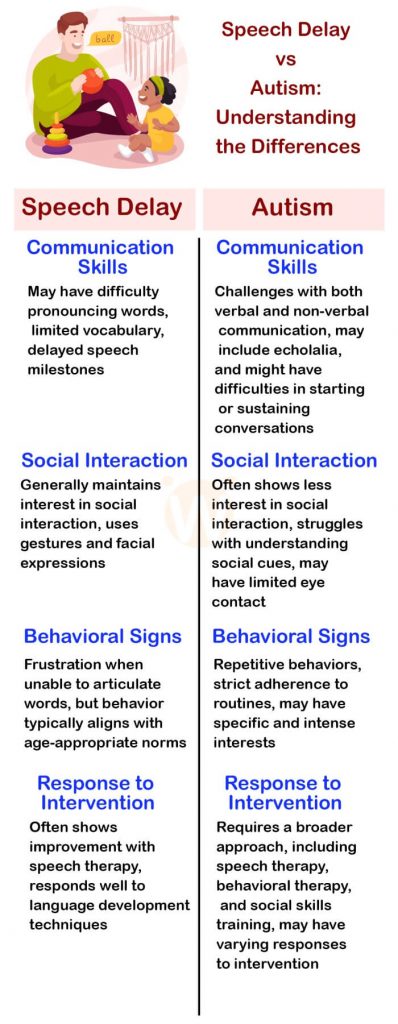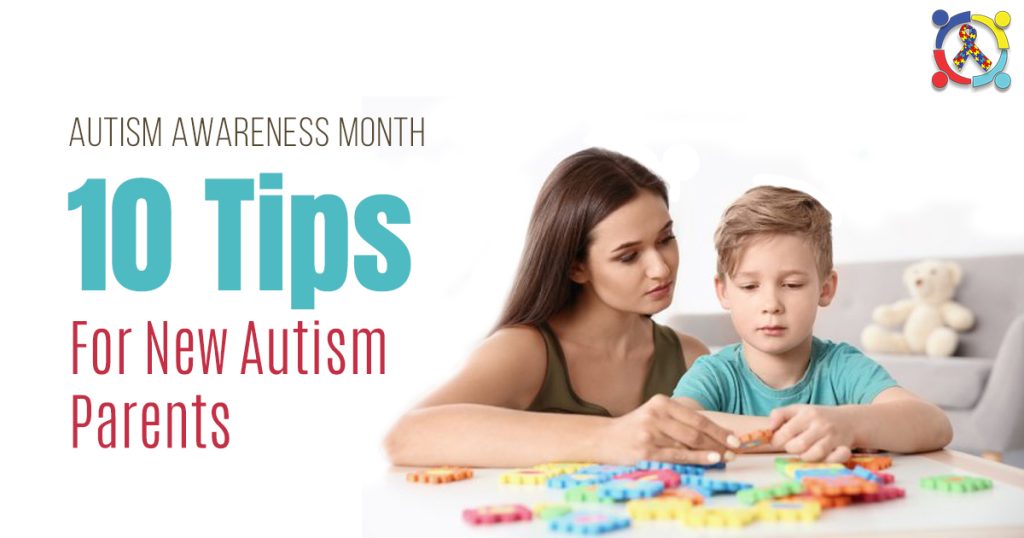Struggling to understand the difference between autism and speech delay can feel overwhelming, especially when you’re trying to make the best decisions for your child’s development. You might notice your child having difficulty expressing themselves, and you’re left wondering if it’s just a speech delay or something more.
It’s not uncommon to feel a mix of confusion and concern, but you’re not alone. By gaining a clear understanding of these two conditions, you can take the right steps towards supporting your child’s unique needs. We’ll break down the key differences between autism and speech delay in simple, straightforward terms.
You’ll gain valuable insights that can help you identify the signs and make informed choices. Read on to discover how you can confidently navigate this important aspect of your child’s growth.

Credit: speechandtalk.com
Signs Of Autism
Identifying autism involves noticing social difficulties, repetitive behaviors, and intense interests. Speech delay focuses on language development, often without these additional signs. Understanding these differences helps in seeking appropriate support.
Understanding the signs of autism is crucial for distinguishing it from speech delay. Autism is a complex condition that affects social interaction, communication, and behavior. Recognizing these signs early can help you seek appropriate support and interventions. Let’s delve into some key signs of autism, focusing on social interaction challenges, repetitive behaviors, and sensory sensitivities.
Social Interaction Challenges
Children with autism often face difficulties in social situations. They may struggle to make eye contact or interpret facial expressions. You might notice they prefer playing alone rather than engaging with peers. A child who doesn’t respond to their name might be showing early signs of autism. If your child shows these signs, consider seeking advice from a specialist. Have you observed if your child avoids physical touch or seems disinterested in playing with others?
Repetitive Behaviors
Repetitive behaviors are another hallmark of autism. This can include actions like flapping hands, rocking back and forth, or spinning objects. These behaviors are often comforting for the child and may become more pronounced in stressful situations. Think about your child’s play habits. Do they line up toys in a specific order or fixate on parts of a toy rather than its function? Such patterns can be indicative of autism. It’s important to note that these behaviors are different from typical childhood routines.
Sensory Sensitivities
Many children with autism experience heightened sensory sensitivities. They may be overly sensitive to sounds, lights, or textures. Loud noises or bright lights might cause distress or lead to avoidance. Consider your child’s reactions to sensory inputs. Does your child cover their ears in loud environments or refuse certain foods due to texture? Understanding these sensitivities can help tailor your approach to their needs. These signs can vary widely, and each child is unique. Observing your child’s behavior closely can help you differentiate between autism and speech delay. If you’re concerned, consulting with a healthcare professional is a valuable step towards understanding your child’s needs.

Credit: www.mywellnesshub.in
Characteristics Of Speech Delay
Understanding the characteristics of speech delay can guide parents and caregivers. Recognizing these traits helps differentiate speech delay from other developmental issues. Speech delay is often mistaken for other conditions like autism. It’s vital to observe specific features.
Delayed Speech Milestones
Children with speech delay often lag in reaching speech milestones. They may not babble by 12 months. Single words might not appear by 18 months. By age 2, they might not combine words into simple phrases. These delays are noticeable compared to peers.
Normal Social Engagement
Children with speech delay usually show normal social engagement. They often make eye contact and smile. They may point to objects and show shared interests. This social interaction is key in distinguishing speech delay from autism.
Cognitive And Learning Patterns
Speech-delayed children often have typical cognitive and learning patterns. They can understand and follow simple instructions. Their problem-solving skills might align with age expectations. This understanding helps identify speech delay distinctly.
Common Misconceptions
Common misconceptions often blur the lines between autism and speech delay. Parents sometimes face confusion when identifying the differences. Understanding these misconceptions is crucial. It helps families seek the right support. Many believe speech delay automatically indicates autism. This is not always true. Autism involves a broader range of symptoms. Speech delay may occur without autism.
Autism Vs Speech Delay Confusion
Confusion arises due to overlapping symptoms. Speech delay is often mistaken for autism. Both conditions can affect communication. Autism encompasses more than speech issues. It includes behavioral challenges. Social interaction difficulties are common in autism. Speech delay focuses mainly on language development. It’s essential to note these distinctions.
Impact Of Early Diagnosis
Early diagnosis plays a vital role. Identifying issues early can lead to better outcomes. Tailored interventions can be implemented. They address specific needs of the child. Early support enhances communication skills. It improves social interactions over time. Families benefit from understanding the child’s needs. This knowledge guides appropriate therapy choices.
Diagnostic Approaches
Understanding the differences between autism and speech delay requires a careful diagnostic approach. Parents often notice delays in their child’s communication skills. But pinpointing the exact cause can be challenging. Each child has unique behaviors and symptoms. Diagnostic evaluations help professionals identify specific conditions. These evaluations involve multiple specialists. Each plays a key role in ensuring accurate diagnosis.
Role Of Pediatricians
Pediatricians often start the diagnostic process. They monitor a child’s development during regular check-ups. This includes speech and social skills. Pediatricians look for signs of autism, such as lack of eye contact. They also check for delays in speech milestones. If concerns arise, they may suggest further evaluation by specialists.
Speech Pathologist Assessment
Speech pathologists specialize in communication disorders. They assess a child’s language skills and speech patterns. This includes understanding and using language. They evaluate how well a child follows directions. Speech pathologists can identify if a delay is present. They also determine if the delay is part of a broader issue like autism.
Autism Specialist Evaluation
Autism specialists provide detailed assessments. They focus on behaviors beyond speech, such as social interaction. Specialists use standardized tests to assess autism symptoms. They look for repetitive behaviors and interests. The evaluation includes gathering information from parents and teachers. This comprehensive approach helps distinguish autism from speech delay.
Treatment And Intervention
Distinguishing between autism and speech delay can be challenging. Focus on social interaction and communication skills for clues. Autism often involves repetitive behaviors and difficulties in social interactions, unlike speech delay, which mainly affects language development. Early intervention aids accurate diagnosis and tailored treatment plans.
Differentiating between autism and speech delay can be challenging, but understanding treatment and intervention can offer clarity. Tailoring approaches to suit each child’s unique needs is crucial. With the right support, children can make significant progress. Let’s explore some effective interventions.
Speech Therapy Techniques
Speech therapy plays a pivotal role in addressing speech delays. Therapists often use engaging techniques to encourage communication. For instance, using picture cards can help children express their needs. Simple games, like naming objects around the house, can be beneficial. These activities increase vocabulary in a fun and interactive way. You might notice your child enjoying these playful sessions, which can boost confidence.
Behavioral Therapies For Autism
Behavioral therapies focus on improving social skills and reducing challenging behaviors. Applied Behavior Analysis (ABA) is widely used for autism. It uses positive reinforcement to teach new skills. Imagine your child learning to share toys during a play session. This small step can lead to more positive interactions. Consistent practice can make these behaviors second nature.
Family Support And Resources
Your involvement is vital in your child’s progress. Family support can make a huge difference. Attending workshops can provide you with helpful strategies. Online forums and support groups offer a space to share experiences and advice. Connecting with other parents can be comforting. You might find new ideas to try with your child. Consider this: What if you became your child’s biggest cheerleader? Advocating for your child can empower both of you. Embrace the journey and celebrate each milestone, however small.
Importance Of Early Intervention
Early intervention can help distinguish autism from speech delay. Recognizing signs early aids in providing targeted support. This approach enhances communication skills and overall development. Identifying the differences allows for tailored strategies, ensuring better outcomes for children.
Understanding the Importance of Early Intervention is crucial when it comes to differentiating between autism and speech delay in children. Recognizing the signs early can make a world of difference. Early intervention provides children with the necessary tools to improve their communication and social skills, giving them a head start in life. Early intervention can significantly impact a child’s development. It’s not just about addressing immediate concerns but setting the stage for future success. By acting promptly, you give your child the best chance to reach their full potential. ###
Long-term Developmental Benefits
Children who receive early intervention often show remarkable improvements. These benefits aren’t just short-term; they extend well into their adult lives. Improved communication skills can lead to better relationships and academic performance. Moreover, early support can help children become more independent, reducing the need for assistance later in life. ###
Case Studies And Success Stories
Consider the story of Emily, a young girl diagnosed with speech delay. Her parents sought early intervention, and today, she’s a confident speaker in her class. Then there’s Jake, who was diagnosed with autism at a young age. With early support, he’s now thriving, participating in social activities, and excelling in school. These stories are not just rare successes. They highlight the power of early intervention and how it can change lives. What if your child could be the next success story?
Frequently Asked Questions
How Do You Know If A Child Is Speech Delayed And Not Autistic?
Observe the child’s social interaction skills and behavior. Speech delay involves late talking but good social skills. Autism often includes challenges in social interactions and repetitive behaviors. Consult a pediatrician or speech therapist for a professional evaluation to differentiate between speech delay and autism.
What Is The Difference Between Speech Delay And Autism?
Speech delay involves difficulty in developing language skills. Autism affects social interaction, communication, and behavior. Autism may include speech delay, but also involves challenges like repetitive behaviors and social difficulties. A professional evaluation helps differentiate between the two.
How Can You Tell The Difference Between Autism And Developmental Delay?
Autism features social communication challenges and repetitive behaviors. Developmental delay affects physical, cognitive, or emotional growth. Professional diagnosis helps differentiate.
What Is The Difference Between Speech Disorder And Autism?
Speech disorders affect the ability to produce sounds correctly. Autism is a developmental disorder impacting communication and social interaction. Both can coexist but have different causes and treatments. Speech therapy may help with speech disorders, while autism requires a broader range of therapies.
Conclusion
Understanding the differences between autism and speech delay is crucial. Early intervention helps children thrive. Autism affects social skills and behavior. Speech delay focuses on language development. Parents should consult professionals for accurate diagnosis. Look for behavioral patterns and developmental milestones.
Each child is unique and deserves tailored support. Stay informed and seek guidance when needed. Collaboration with therapists and educators can aid progress. Patience and understanding are key. Empowering parents and caregivers fosters a supportive environment. Celebrate small achievements and encourage communication growth.

